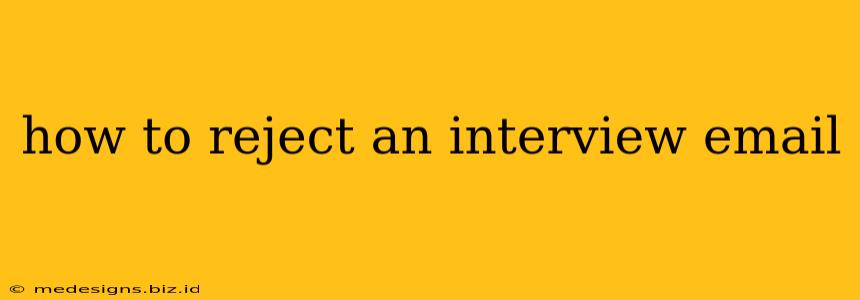How to Reject an Interview Email Professionally
Landing a job interview is exciting, but sometimes circumstances change, or another opportunity arises that's a better fit. Knowing how to politely decline an interview invitation is crucial for maintaining professional relationships and leaving a positive impression. This guide provides you with effective strategies for rejecting an interview email gracefully.
Why Rejecting Professionally Matters
While it might seem like a small detail, declining an interview request with courtesy speaks volumes about your character and professionalism. It reflects your respect for the recruiter's time and the company's efforts. A well-crafted rejection can even open doors for future opportunities with the same company or within the same network. Neglecting to respond, or sending a curt, unprofessional rejection, can damage your reputation and hinder your job search.
Crafting the Perfect Rejection Email: Step-by-Step
Here's a step-by-step guide to writing an email that declines an interview while maintaining professionalism:
1. Prompt Response: Aim to respond within 24 hours of receiving the invitation. This shows respect for the recruiter's time and keeps the process moving.
2. Express Gratitude: Begin by thanking the recruiter for their time and consideration in inviting you to interview. Acknowledge their offer and express appreciation for their interest in your candidacy. For example:
Thank you so much for inviting me to interview for the [Job Title] position at [Company Name]. I truly appreciate you considering my application.
3. Politely Decline: Clearly and concisely state your decision to decline the interview. Avoid ambiguity or leaving room for misinterpretation. Be direct but polite. You can use phrases like:
After careful consideration, I have decided to decline the interview invitation at this time. While I'm very grateful for the opportunity, I've decided to pursue another opportunity that aligns more closely with my current career goals.
4. Optional: Briefly Explain (Without Overexplaining): While you don't need to provide a detailed explanation, a brief, non-committal reason can add a touch of professionalism. Avoid negativity or excessive detail. Some examples include:
...due to other commitments. ...as I've accepted another position. ...after further reflection on my career path.
5. Maintain Professionalism: Keep your tone respectful and professional throughout the email. Avoid overly casual language or negativity.
6. Express Future Interest (Optional): If you foresee future possibilities with the company, you can subtly express interest in future opportunities. For example:
I appreciate you considering my application and wish you the best in your search for a suitable candidate. I hope to keep [Company Name] in mind for future opportunities.
7. Proofread Carefully: Before sending, meticulously proofread your email for any grammatical errors or typos. This reflects your attention to detail and professionalism.
Example Rejection Email
Here's an example of a well-crafted rejection email:
Subject: Interview for [Job Title] - [Your Name]
Dear [Recruiter Name],
Thank you so much for inviting me to interview for the Marketing Manager position at Acme Corporation. I truly appreciate you considering my application.
After careful consideration, I have decided to decline the interview invitation at this time due to other commitments.
I appreciate you taking the time to review my application and wish you the best in your search for a suitable candidate.
Sincerely,
[Your Name]
Key Takeaways:
- Timeliness is key: Respond promptly.
- Gratitude goes a long way: Express appreciation for the opportunity.
- Be clear and concise: State your decision directly.
- Maintain professionalism: Keep your tone respectful.
- Proofread carefully: Avoid errors.
By following these steps, you can confidently and professionally reject an interview email, leaving a positive impression and maintaining your professional reputation. Remember, even in rejection, you are building your professional network and creating opportunities for the future.
